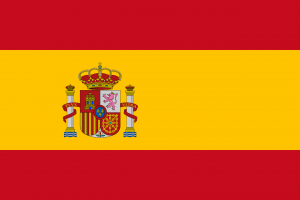Difference between revisions of "Language/Spanish/Grammar/Plural"
Jump to navigation
Jump to search
Edicon2112 (talk | contribs) (Add new examples, correct some words and modify the structure of the article) |
|||
| (8 intermediate revisions by 3 users not shown) | |||
| Line 1: | Line 1: | ||
[[File:Spanish-Language-PolyglotClub.png|thumb]] | |||
In Spanish language the plurals are determined by | <div class="pg_page_title">The Plurals in Spanish</div> | ||
In Spanish language the plurals are determined by feminine (las) and masculine (los) articles. Most of the sustantives have a singular and a plural form. | |||
Example: | Example: | ||
*El sol / Los soles | |||
*El avión / Los aviones | |||
*La taza / Las tazas | |||
==General rule== | |||
Usually the sustantives that end in vowels (a,e,i,o,u) turn into plurals with an 's' added at the end. | |||
Example: | Example: | ||
*El amigo / Los amigos | |||
*La vaca / Las vacas | |||
==Words ending in -í or -ú== | |||
When the last letter is an í or ú with accent, an 'es' is added. | |||
Example: | Example: | ||
*El ají / Los ajíes | |||
*El iglú / Los iglúes | |||
==Words ending in -d, -l, -r, -z...== | |||
When the the sustantive ends in ''(d, l, r, or z, …) -''es is also added. The z ''also'' transforms into a 'c'. | |||
Example: | Example: | ||
*El leñador / Los leñadores | |||
*La actriz / Las actrices | |||
==Exceptions== | |||
Thought there are exceptions like : | |||
*El cactus / Los cactus | |||
*El tórax / Los tórax | |||
==Words only in the plural== | |||
There are sustantives that exist only in the plural: | |||
*Los honorarios, las facciones, las gafas, los víveres. | |||
==Words only in the singular== | |||
And there are sunstantives that are used only in the singular: | |||
*La sed, el caos, el este, el oeste. | |||
==Other Lessons== | |||
* [[Language/Spanish/Grammar/Past-Participle|Past Participle]] | |||
* [[Language/Spanish/Grammar/How-to-Use-Be-(SER-and-ESTAR)|How to Use Be (SER and ESTAR)]] | |||
* [[Language/Spanish/Grammar/The-noun-gender|The noun gender]] | |||
* [[Language/Spanish/Grammar/Present-Progressive|Present Progressive]] | |||
* [[Language/Spanish/Grammar/Orientación-sobre-el-uso-de-Articulos|Orientación sobre el uso de Articulos]] | |||
* [[Language/Spanish/Grammar/The-Articles|The Articles]] | |||
* [[Language/Spanish/Grammar/How-to-conjugate-in-spanish|How to conjugate in spanish]] | |||
* [[Language/Spanish/Grammar/Comaratives-and-Superlatives|Comaratives and Superlatives]] | |||
* [[Language/Spanish/Grammar/Los-pronombres-personales|Los pronombres personales]] | |||
* [[Language/Spanish/Grammar/How-to-use-Ser-o-Estar-(verb-to-be)|How to use Ser o Estar (verb to be)]] | |||
<span links></span> | |||
Los | |||
Latest revision as of 19:53, 28 March 2023
The Plurals in Spanish
In Spanish language the plurals are determined by feminine (las) and masculine (los) articles. Most of the sustantives have a singular and a plural form.
Example:
- El sol / Los soles
- El avión / Los aviones
- La taza / Las tazas
General rule[edit | edit source]
Usually the sustantives that end in vowels (a,e,i,o,u) turn into plurals with an 's' added at the end.
Example:
- El amigo / Los amigos
- La vaca / Las vacas
Words ending in -í or -ú[edit | edit source]
When the last letter is an í or ú with accent, an 'es' is added.
Example:
- El ají / Los ajíes
- El iglú / Los iglúes
Words ending in -d, -l, -r, -z...[edit | edit source]
When the the sustantive ends in (d, l, r, or z, …) -es is also added. The z also transforms into a 'c'.
Example:
- El leñador / Los leñadores
- La actriz / Las actrices
Exceptions[edit | edit source]
Thought there are exceptions like :
- El cactus / Los cactus
- El tórax / Los tórax
Words only in the plural[edit | edit source]
There are sustantives that exist only in the plural:
- Los honorarios, las facciones, las gafas, los víveres.
Words only in the singular[edit | edit source]
And there are sunstantives that are used only in the singular:
- La sed, el caos, el este, el oeste.
Other Lessons[edit | edit source]
- Past Participle
- How to Use Be (SER and ESTAR)
- The noun gender
- Present Progressive
- Orientación sobre el uso de Articulos
- The Articles
- How to conjugate in spanish
- Comaratives and Superlatives
- Los pronombres personales
- How to use Ser o Estar (verb to be)
